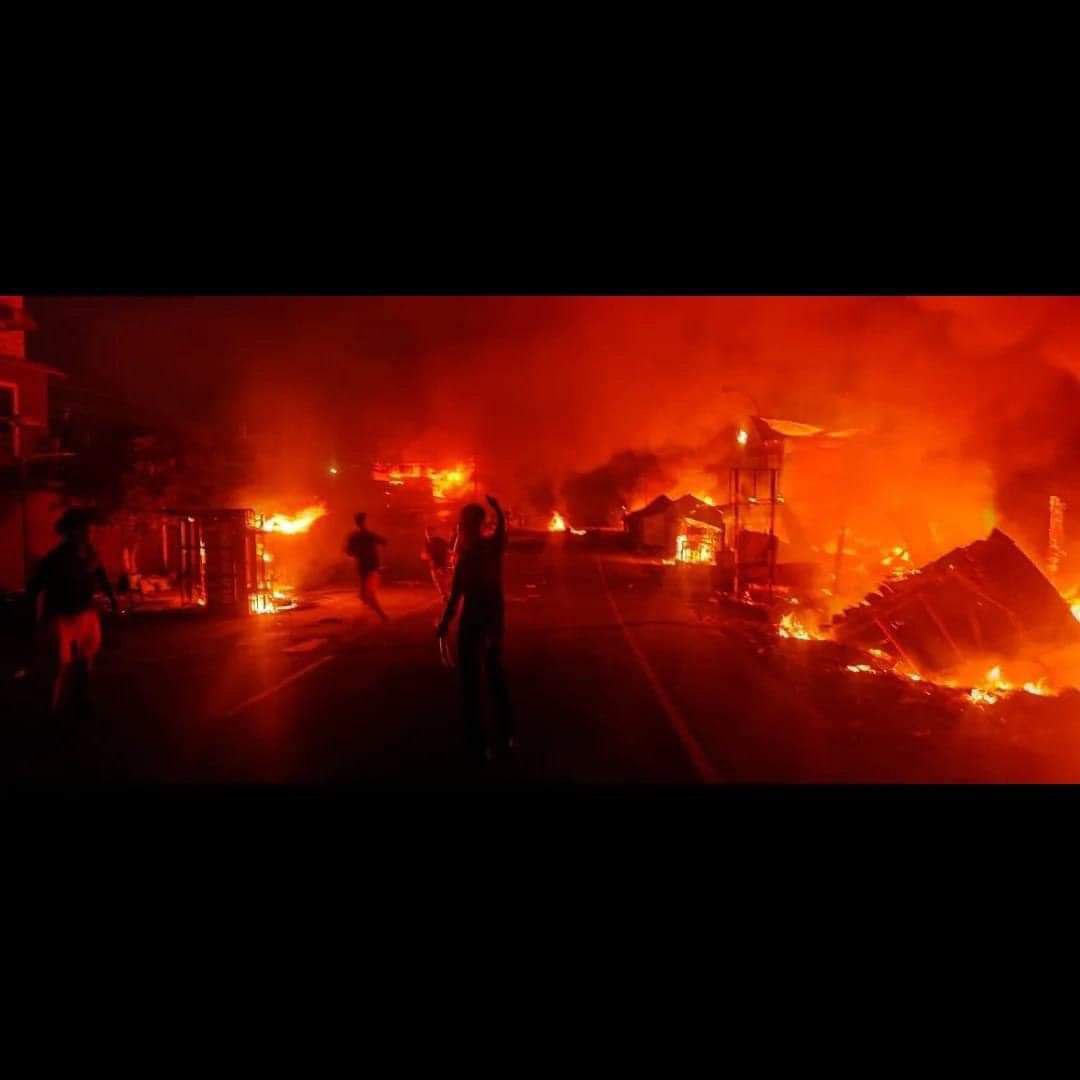A day after violence broke out between tribals and the majority Meitei community, the Manipur government on Thursday issued ‘shoot at sight’ order in “extreme cases”.
The clashes have already displaced over 9,000 people from their villages.
Fifty-five columns of the Army and Assam Rifles had to be deployed to contain widespread rioting that broke out across Manipur between tribals and the majority Meitei community, displacing over 9,000 people.
The Army also kept some 14 columns on standby for deployment in case the situation flared up once again, a defence spokesperson said.
The Centre, which is monitoring the situation in Manipur, also dispatched teams of the Rapid Action Force (RAF), a specialised force to handle riots, for deployment in violence-hit areas of the Northeastern state.
Sources said the force landed at Imphal airport this evening.
Clashes broke out on Wednesday which intensified overnight with counter-attacks being mounted by rival communities in retaliation to earlier attacks, after Naga and Kuki tribals organised a ‘Tribal Solidarity March’ to protest moves to give scheduled tribe status to the majority Metei community.
The ‘shoot at sight’ order issued Thursday by the Governor of the northeastern state said all magistrates could issue the order when persuasion, warning and reasonable force “have been exhausted and the situation could not be controlled”.
The notification signed by the Commissioner (Home) of the state government was issued under provisions of the criminal procedure code 1973.
The army and Assam Rifles staged flag marches in Khuga, Tampa, Khomaujanbba areas of Churachandpur. Flag marches were also carried out in Mantripukhri, Lamphel, Koeirangi area of Imphal Valley, and Sugnu in Kakching district on Thursday, the defence spokesperson said.
Underlining the gravity of the violence, Union Home Minister Amit Shah on Thursday spoke to Manipur Chief Minister N Biren Singh and took stock of the situation in the state.
So far, 9,000 people were rescued by the forces from the violence-hit areas, and given shelter, the spokesperson said, adding that more people are being shifted to safer places.
The spokesperson said that some 5,000 people have been shifted to safe homes in Churachandpur, another 2,000 people were similarly evacuated in Imphal Valley, and 2,000 people in the border town of Moreh in Tenugopal district.
The Army and Assam Rifles were requisitioned last night, and along with the state police, the forces arrested the violence by the morning, the spokesperson said.
“Flag marches are being conducted to keep the situation under control,” he said.
The ‘Tribal Solidarity March’ was organised by the All Tribal Student Union Manipur (ATSUM) in the ten hill districts of the state on Wednesday to protest the demand of non-tribal Meiteis, who account for 53 per cent of the state’s population, for Scheduled Tribe (ST) status.
The march was organised by tribals who account for about 40 per cent of the state’s population after the Manipur High Court asked the state government last month to send a recommendation to the Centre within four weeks on the demand for ST status by the Metei community.
During the march in Torbung area of Churachandpur district, an armed mob allegedly attacked people of the Meitei community, leading to retaliatory attacks in the valley districts, which escalated the violence throughout the state, according to police.
Many shops and houses were vandalised, and gutted in arson that lasted for more than three hours in Torbung, they said.
Urging people to maintain peace, Chief Minister N Biren Singh said, “Precious lives have been lost, besides damage of properties, which is very unfortunate.”.
However, the details of the deaths were not immediately available.
Singh said the violence was the result of “misunderstanding” in the society.
“The state government is taking all steps to maintain the law and order situation and additional para-military forces have been requisitioned to protect the lives and properties of the people,” he said.
“Central and state forces have been directed to take strong action against individuals and groups who are indulging in violence,” he said.
The Chief Minister of neighbouring Mizoram, Zoramthanga, wrote to Singh, expressing concern over the violence.
“As the Chief Minister of Mizoram, a lifelong neighbour that has much in common with Manipur in terms of history and culture, I am deeply pained by the violence that has flared up in parts of your State and the underlying tension between the Meitei community and the tribals there,” he wrote in the letter.
Singh said he spoke to Zoramthanga on the phone and apprised him of the present situation.
Rs Curfew has been imposed in Meitei-dominated Imphal West, Kakching, Thoubal, Jiribam, and Bishnupur districts, and tribal-dominated Churachandpur, Kangpokpi, and Tengnoupal districts.
Mobile internet services were suspended across the state.
In the Imphal valley, houses of Kuki tribals were ransacked in several areas, forcing them to flee, police said.
Over 500 residents of the Kuki-dominated Langol area in Imphal West fled their homes, and are currently staying at the CRPF camp at Lamphelpat, police said.
Some places of worship were also set on fire in the Imphal valley last night, they said.
Meanwhile, around 1,000 Meiteis of the tribal-dominated Churachandpur district fled to various areas of Bishnupur district, including Kwakta and Moirang, they said.
Over twenty houses were also burnt in Motbung area of Kangpokpi district, police said.
Violence was also reported from Moreh near the Myanmar border in Tengnoupal district.
Lawmakers of the valley have earlier openly endorsed the demand by some Meitei organisation for ST status, alarming communities who figure in the Scheduled Tribe list.
The Meiteis inhabit the valley, which accounts for about a tenth of the former princely state’s land area. They claim they are facing problems because of “large-scale illegal immigration by Myanmarese and Bangladeshis”.
The hill districts which account for much of the state’s land are inhabited mostly by tribals — including the Nagas and Kukis who are mainly Christians — and are protected from encroachment by various laws.
(With PTI inputs)





